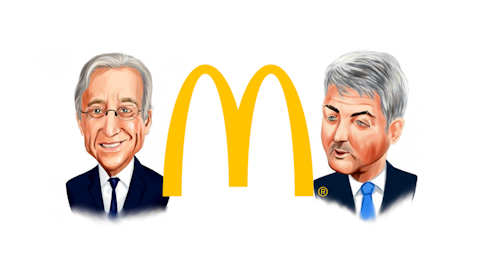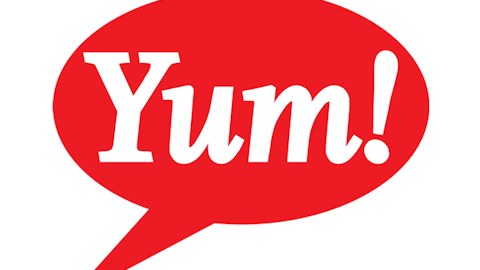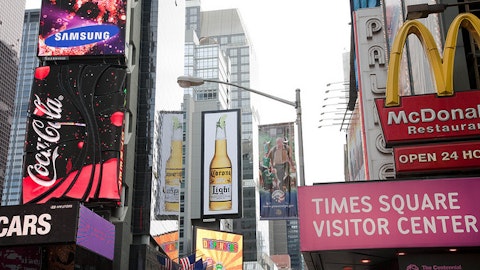Stephen J. Errico founded Locust Wood Capital Advisers, a New York-based long/short equity hedge fund, in 2002. Prior to founding Locust Wood, Mr. Errico worked for 20 years as an adviser at Lehman Brothers, Paine Webber, and Morgan Stanley. Since its inception, the fund has grown from $29 million in assets under management (AUM) to $992 million in AUM, as of May 31, 2015. Locust Wood recently filed its 13F for the June 30 reporting period with the Securities and Exchange Commission (SEC). According to the filing, Locust Wood’s U.S. public equity portfolio was worth $723.56 million at the end of the second quarter, 8.7% less than the $792.07 million that it was worth at the end of the first quarter. Among the sectors invested in, consumer discretionary and finance led the way, with Locust Wood’s stock picks from them constituting 33% and 25% of the fund’s equity portfolio respectively. The filing revealed that the top ten holdings of Locust Wood accounted for 48.37% of its equity portfolio at the end of the second quarter, and that during the quarter, Locust Wood initiated a stake in six stocks, made additional purchases in 14 stocks, sold its entire stake in nine stocks and reduced its holdings in 19 stocks. Moreover, the filing also revealed that although Locust Wood had a fairly diversified portfolio during the second quarter, food stocks constituted a significant portion of it. In this article we are going to take a closer look at Locust Wood’s top three food stock picks, which together constituted 10.16% of the fund’s equity portfolio at the end of June: McDonald’s Corporation (NYSE:MCD), Yum! Brands, Inc. (NYSE:YUM), and Kraft Foods Group Inc (NASDAQ:KRFT).

But first let’s first take a step back and analyze how tracking hedge funds can help an everyday investor. Through our research we discovered that a portfolio of the 15 most popular small-cap picks of hedge funds beat the S&P 500 Total Return Index by nearly a percentage point per month on average between 1999 and 2012. On the other hand the most popular large-cap picks of hedge funds underperformed the same index by seven basis points per month during the same period. This is likely a surprise to many investors, who think of small-caps as risky, unpredictable stocks and put more faith (and money) in large-cap stocks. In forward tests since August 2012 these top small-cap stocks beat the market by an impressive 66.5 percentage points, returning over 123.1% (read the details here).
Follow Stephen Errico's Locust Wood Capital Advisers
Coming back to Locust Wood’s top food picks, the fund purchased an additional 5,610 shares of McDonald’s Corporation (NYSE:MCD) during the second quarter, owning 313,100 shares of the company valued at $29.77 million at the end of June. The company recently reported its second quarter earnings, and although its EPS of $1.26 on revenue of $6.5 billion for the quarter was better than analysts’ consensus estimate of EPS of $1.23 on revenue of $6.4 billion, it was much lower than the EPS of $1.40 on revenue of $7.18 billion that it reported for the same quarter of last year. With a 2% decline, comparable sales in the U.S. continued to slump for the company. Additionally, the company also reported a decline of 4.5% in comparable store sales in the APMEA region. In recent weeks there have been murmurs on the Street that McDonald’s Corporation (NYSE:MCD) might seriously consider spinning off its real estate assets into a REIT, a move recently undertaken by Sears Holdings Corporation (NASDAQ:SHLD). McDonald’s Corporation (NYSE:MCD) is one of the most popular stocks among the hedge funds we track, with 89 of the 730 reporting funds disclosing a position in the company at the end of the first quarter. Jonathon Jacobson’s Highfields Capital Management reported increasing its stake by 1,177% in the company during that period to 9.81 million shares.
Although Locust Wood reduced its stake in Yum! Brands, Inc. (NYSE:YUM) by 1% during the second quarter after reducing its stake by 18% in the first quarter, it could be seen as a profit booking move, as shares of the company continued their ascent, rising by 15% during the quarter. As of June 30, the 276,470 shares that Locust Wood owned of Yum! Brands, Inc. (NYSE:YUM) were worth $24.9 million. The company reported its second quarter financial results on July 15 and similar to McDonald’s Corporation (NYSE:MCD), cited a sales decline in China as the reason for its poor showing. The second food safety scare in China last year (after the first one in 2013) weighed heavily on comp sales, which were down by 10% year-over-year, but better than last quarter’s 12% decline. As China continues to play spoilsport for Yum! Brands, Inc. (NYSE:YUM), Keith Meister’s Corvex Capital and Dan Loeb‘s Third Point reported having initiated a stake in the company during the first quarter, with the intention of pushing the company to spin off its China unit.
Moving on, Locust Wood initiated a stake in the now-defunct Kraft Foods Group Inc (NASDAQ:KRFT) by acquiring 222,210 shares of the company during the second quarter, which were worth almost $19 million as of June 30, 2015. Shares of the packaged food and beverage company spiked on March 25 when it was announced that the company would be combined with Heinz to create a separate entity, Kraft Heinz Co (NASDAQ:KHC), in a $46 billion merger deal orchestrated by Heinz’s largest shareholders: Jorge Paulo Lemann‘s 3G Capital and Warren Buffett’s Berkshire Hathaway. The deal was completed on July 2. Within our database, James Dinan’s York Capital Management, with almost 6.0 million shares, was the largest shareholder of Kraft Foods Group Inc (NASDAQ:KRFT) at the end of march.
Disclosure: None





